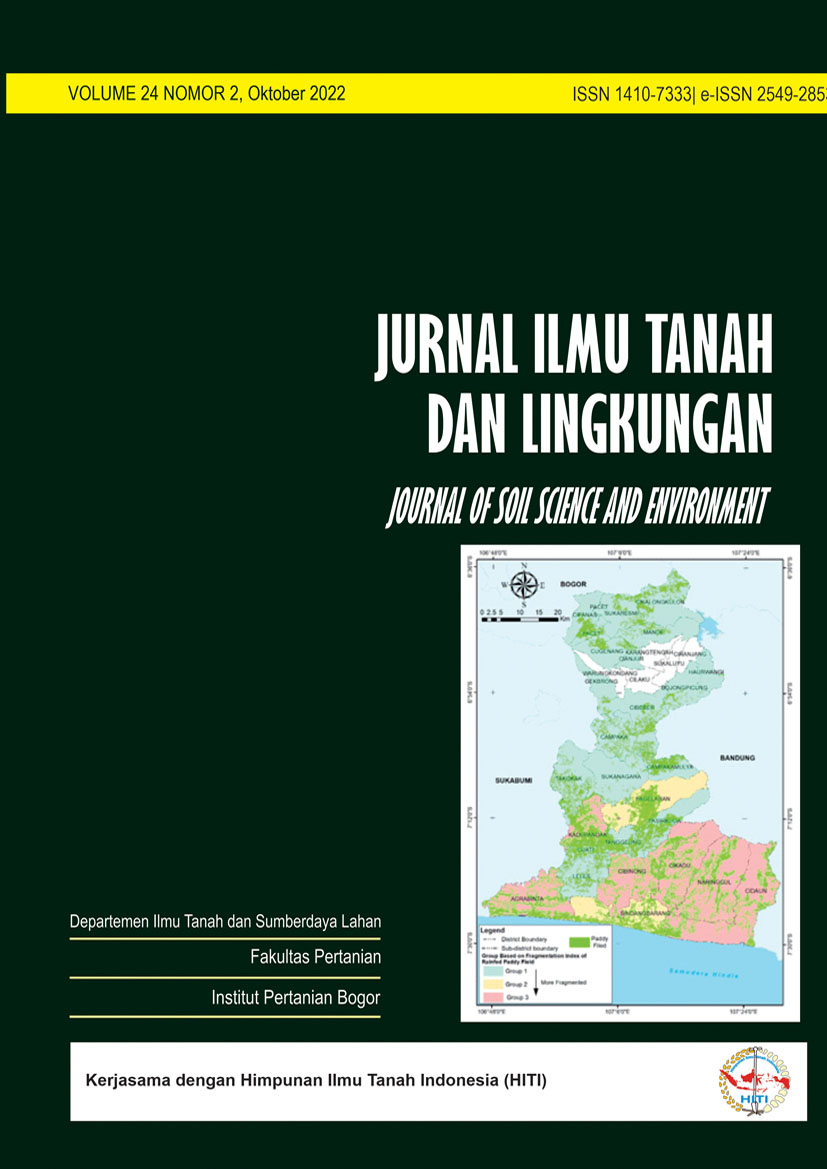Land Use Identification and Spatial Pattern Suitability Analysis using 2020 Landsat 8 OLI Imagery
Case Study: Cikeruh, Citarik, and Cirasea Sub-watersheds
Abstract
Cikeruh, Citarik, and Cirasea sub-watersheds are part of the Citarum watershed which has been included in the 15 priority watersheds for critical land restoration. One of the causes of land criticality is land uses that is not in accordance with land capabilities or spatial pattern directions. The purpose of this study was to identify the types of land use in Cikeruh, Citarik, and Cirasea Sub-watersheds in 2020 and to evaluate the suitability of land use based on the spatial pattern of the West Java Regional Spatial Plans period of 2009-2029. This research was conducted through a descriptive-quantitative analysis approach through interpretation of Landsat 8 OLI satellite imagery using supervised classification method and maximum likelihood algorithm. Suitability analysis was conducted using the overlay (union) method between the resulted land use data and the spatial pattern of the West Java Regional Spatial Plans. The results of the Landsat 8 OLI image interpretation identified 5 land uses with the highest area, showed: dry land agriculture, forest, built-up land, rice field, and bare land covered 35,696.60 ha (41.78%), 14,819.90 ha (17.34%), 12,959.50 ha (15.17 %), 9,112.95 ha (10.67%), 5,862.92 (6.86%) respectively. The accuracy level of the classification showed an overall accuracy value of 91.25% and a kappa index reached 0.90. Based on the results of the 2020 land use analysis of the Regional Spatial Plan, it showed that 40,997.18 Ha (47.98%) was suitable, 17,172.46 Ha (20.10%) was not suitable yet, and 2,276.99 Ha (31.92%) ) was not suitable.
Downloads
References
Arsyad, S. 2010. Konservasi Tanah dan Air. 2nd ed. IPB Press, Bogor.466 pp.
Asdak, C. 2014. Hidrologi dan Pengelolaan Daerah Aliran Sungai. 6th ed. Gadjah Mada University Press, Yogyakarta. 630 pp.
Banuwa, I.S. 2013. Erosi. Kencana Prenada Media Group. Jakarta. 205 .
Haryanto, E. T., T. Herwanto, and D.R. Kendarto 2007. Perubahan bentuk penggunaan lahan dan Implikasinya terhadap koefisien air larian DAS Citarum Hulu Jawa Barat. Jurnal Bionatura, 9(1): 1-15.
Hu, D., G. Yang, Q. Wu, H. Li, X. Liu, X. Niu, Z. Wang, and Q. Wang.. 2008. Analyzing land use changes in the metropolitan jilin city of Northeastern China Using Remote Sensing and GIS. Sensors, 8(9): 5449-5465. https://doi.org/10.3390/s8095449
Jaya, I.N.S. 2014. Analisis Citra Digital (Perspektif Pengideraan Jauh Untuk Pengelolaan Sumber Daya Alam). IPB Press. Bogor.
Lillesand, T., R.W. Kiefer, and J. Chipman. 2015. Remote sensing and image interpretation. John Wiley & Sons, Inc., New York
Meijer, A.D., J.L. Heitman, J.G. White, and R.E. Austin. 2013. Measuring erosion in long term tillage plots using grounds based lidar. Journal Soil and Erosion, 126: 1-10.
Mukhoriyah, S. A., danS. Arifin. 2017. Identifikasi Penggunaan Lahan Di Kabupaten Merauke Menggunakan Citra Landsat 8. In Seminar Nasional Geomatika. Jakarta .p. 2017-2.
Salim, A.G., I.W.S. Dharmawan dan B.H. Narendra. 2019. Pengaruh luas tutupan lahan hutan terhadap karakteristik hidrologi DAS Citarum Hulu. Jurnal Ilmu Lingkungan, 17(2): 333-340.
Sampurno, R.M., A. Thoriq. 2016. Klasifikasi tutupan lahan menggunakan citra landsat 8 operational land imager (OLI) di Kabupaten Sumedang. Jurnal Teknotan, 10(2): 61-70
Viera, A.J., and M.J. Garrett. 2005. Understanding interobserver agreement: the kappa statistic. Fam med, 37(5): 360-363.
Wicaksono, D.A. 2018. Analisis perubahan penggunaan lahan di das kalisari menggunakan remote sensing (Doctoral dissertation, Universitas Brawijaya).
Zhao, X., J. Pu, X. Wang, J. Chen, L.E. Yang, and Z. Gu. 2018. Land-use spatio-temporal change and its driving factors in an artificial forest area in Southwest China. Sustainability, 10(11): 4066.
Copyright (c) 2022 Jurnal Ilmu Tanah dan Lingkungan

This work is licensed under a Creative Commons Attribution-ShareAlike 4.0 International License.
Department of Soil Science and Land Resources Departemen Ilmu Tanah dan Sumberdaya Lahan, Faculty of Agriculture Fakultas Pertanian, IPB University



















